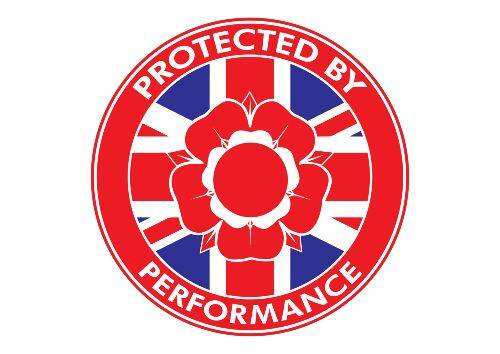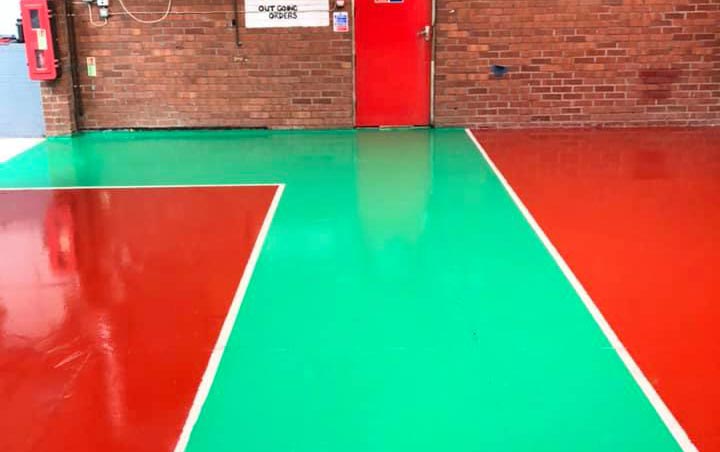All Blogs
Floor Paint vs Epoxy, How To Choose Which is Best?
Table of Contents

Floor Paint vs Epoxy, Let’s Discuss The Difference…
Choosing the right floor paint is no easy task when you consider all of the factors. For example, traffic on the floor, surface type, and what has been painted on it before.
Whether you’re looking to paint your garage floor or need your whole warehouse floor painted, we’ll talk about the differences, advantages / disadvantages of each to make it easier for you to choose the right product.
What is Epoxy?
Epoxy floor paint differs from regular floor paints because it is chemically distinct. Resinous floors consist of a two part epoxy system, which is made up of polymers and hardeners – things like epoxy glue.
When the resins are properly mixed with the hardener, they react to one another resulting in a chemical bond between them and their substrate (the floor). This creates an almost plastic material that’s durable as well as resistant to degradation; it also bonds exceptionally well with its surface, providing an extremely tough floor coating.
Epoxy coatings are used in a variety of applications but you’ll likely see them most in commercial floorings such as DIY stores or places that have heavy foot traffic mainly due to the durability of the system. It is a flooring system that many businesses rely on.
You should always aim for a 2-Part epoxy, some are sold as a single system with an optional choice to apply a second coat to dramatically improve the aesthetics and durability.
What’s a Single Pack Floor Paint?
This is the most common type of paint for homeowners that wish to restore an old floor or perhaps even to just change the colour of the room. The process behind this type of floor coating is simple and cost effective.
Floorboards and garage floors are typical types of floor for standard paint to be applied to, choosing the right colour can transform a rooms look and feel – not forgetting the amount of colours you can choose and flexibility of even splitting the room up in multiple colours.
One issue with normal floor paints is that it isn’t entirely great for heavy foot traffic areas, it’ll be prone to chipping and discolouration over time, this means a periodic reapplication to the floor may be necessary. Cosmetically though, this does the job well as it’ll cover most stains and dirt.
There are products that are manufactured specifically for floor types, like this anti slip garage floor paint in various colours.
Advantages and Disadvantages Between The Both
Epoxy – Advantages
Low Cost:
Epoxy floors are a better option than other types of flooring as they have lower installation costs. This is because it can be installed on top of concrete and over existing flooring materials. However, the cost per square foot is still one of its biggest advantages.
Aesthetics:
Compared to an average garage floor, epoxy floors are much more appealing. Their appearance alone is overpowering and appealing. The smoothness of the surface makes it very easy for sweeping and maintenance as well as being less sticky than other types of floors which make cleaning up a lot easier!
Highly Durable:
Epoxy floors have a longer lifespan than many other floor types. They need to be properly sealed and maintained, but they are the only type of floors that can beat concrete.
If you wish for your floor maintenance efforts to go one step beyond what an ordinary coating can offer- consider getting yourself some solvent based polyurethane varnish for wooden surfaces.
Epoxy coatings make cement more durable than it already is, not just because epoxies require concrete in order to stick, but also because epoxy resin makes it even more durable as you walk on them all day long!
Protection:
Epoxy flooring protects the concrete underneath, so you don’t have to worry about stains and cracks over time. This can save a lot of money on cleaning costs in the long run by eliminating carpet or grout needs.
We always recommend finding a professional to lay your epoxy floor as the protective peace of mind will depend on the skill of the tradesman.
Alongside the protection, Epoxy lasts far longer than other types of floor coatings. This is where the commercial industries take full advantage of it vs standard floor paints, if applied correctly it could last many decades.
Epoxy – Disadvantages
Small Damages Become an Annoyance
Even though the pros completely outweigh the cons, there are common problems such as clippings to the floor, which even though look small, can eventually lead to areas of the epoxy floor peeling off. The sections can be repaired though!
Preparation
Cleaning up a concrete floor before applying epoxy is a time-consuming process. In order for the application to go smoothly, you have to be sure that there is no grease or solvents on the floor when it’s being prepared. This will require multiple attempts of cleaning and filling in cracks as well.
The finished product will take longer to be completely ready for use, some floors require 2 coats which then must be divided in an 8-12 hour drying period.
It is worth noting that you should be thoughtful on the type of concrete you’re going to apply the epoxy to, some can have a slightly polished finish which would require an application of acid etch on before beginning. If there’s any concern about the top coating bonding properly, a recommendation would be a concrete primer, this in the long run will dramatically reduce any peeling.
Single Floor Paint – Advantages
Traditional floor paints are great to use for when you want a variety of colours and are budget conscious, most people are confident to get painting themselves, scratching up on their DIY skills and a sense of self accomplishment.
Preparation
Prepping the floor is nice and simple, just ensure the area that you’re looking to paint is clean. For more harder to remove stains and dirt, grab yourself a Jet wash as it’ll make the process quicker and cleaner. This type of paint is commonly used in Garages and rooms with wooden floors.
Colours and More Colours
We’ve all been there when we’re set on a choice of colour for the project in hand but then when applied, you want to change it…ouch!
Never mind though as standard floor paints have a huge variety of colours to choose from and to reapply another coat of a different colour is easy, no need to call in the professionals as you’re a DIY guru already.
Clean
If you’re deciding to paint on Concrete, such as your garage floor then cleanliness is a big pro!
Bare concrete always produces a layer of dust and holds dirt well, this is a major pain when walking from the garage inside your house or getting in your car that you’ve just valeted….Painting even a single coat on the floor will prevent issues like this.
Floor Paint – Disadvantages
Durability
This will always be a problem because standard floor paints are prone to chipping, they’re not typically designed for heavy-traffic areas so will show many signs of wear and tear as soon as a few months after application.
Costs of repeating
The short term benefits are great as you save money and can do the work yourself, but if you’ve decided to put this paint on a floor in a high-traffic area – the long term costs of your time and money to reapply the paint can work out the same as an Epoxy job at the start.
Coo-Var
Coo-Var Power Floated Floor Primer is a water based, two pack clear epoxy primer paint that is designed to give better adhesion on power floated floors.
- Assists with adhesion of topcoat
- Fast drying and low odour
- Suitable for Concrete
- Apply by Brush or Short pile Roller
- Semi Gloss Finish
Touch dry in 2 to 3 hours and hard dry in 16 hours. Leave 16 hours before overcoating.
In Stock – Express Delivery Available Shop Now:
Epoxy Floor Paint
Conclusion
Given the pros and cons talked about above, both paint systems are very popular all over the world, the choice of which one to use mainly comes from:
- The purpose of area that you’ll be applying the paint to
- Time & Budget
- Finding a skilled professional
We hope that this guide has helped. Palatine Paints have been manufacturing paints for over 75 years and have a dedicated technical and sales team to answer any questions you may have, about any number of our product ranges.
If you have any questions on the products we’ve listed here, our dedicated sales and/or technical team are here to help.
Email: [email protected]
Call Us: 01942 884 122



